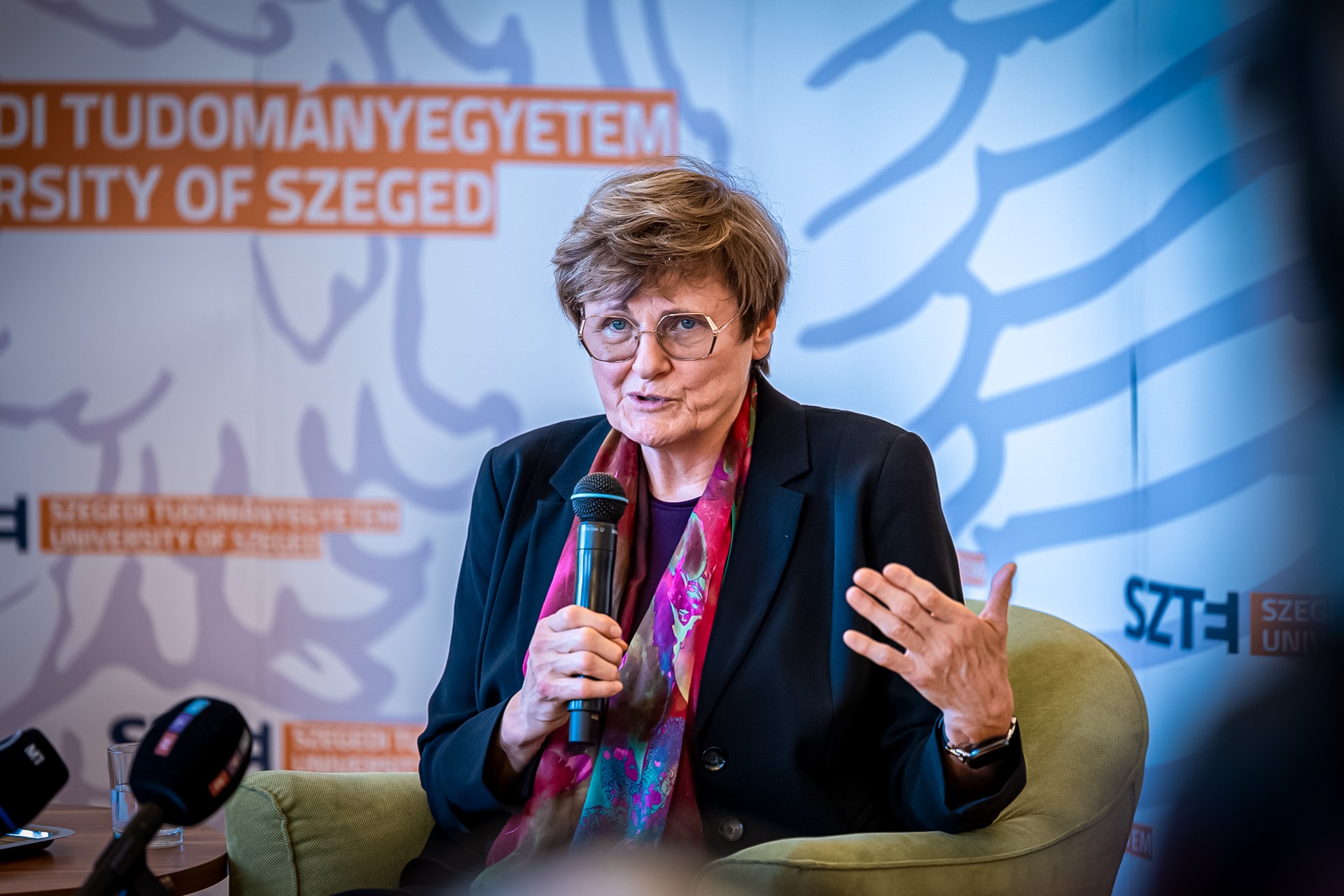
Katalin Karikó's series of achievements shows no signs of slowing down following the recent Nobel Prize announcement. In the past two months, the esteemed research professor at the University of Szeged has garnered numerous recognitions, reclaiming her title as the most influential scientist, maintaining her role as a mentor, earning yet another prestigious award, engaging with celebrities, and contributing to her list of accomplishments by publishing articles about her remarkable autobiography, "Breakthroughs."
"On December 4, 2023, Katalin Karikó is scheduled to arrive in Stockholm, just ahead of the official opening of Nobel Week. To appreciate the journey leading up to this moment, let's rewind to the announcement of her well-deserved honor two months ago. The celebrations honoring the world-renowned Hungarian biochemist and research biologist at the University of Szeged will extend from America to Europe and Hungary."
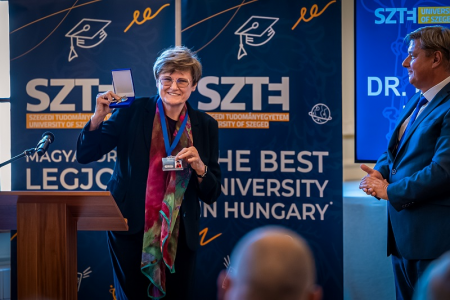
"Thousands of Szeged residents warmly welcomed Nobel laureate Katalin Karikó in the city of her University, where she has found a new home: she was provided with an office at the University of Szeged."
The Most Influential Scientist
Katalin Karikó, recognized as the most influential scientist, has been honored as one of the 25 most influential women of 2023 by Financial Time magazine.
The list, published on 30 November, also includes Margot Robbie, the Australian star of the Barbie film, and Beyoncé, the 30-time Grammy Award-winning American singer. In the 'Heroes' category, where Katalin Karikó has been recognized, Narges Mohammadi, an Iranian journalist and Nobel Peace Prize winner, is honored as an 'activist'.
Influential women are showcased in Financial Time magazine's Women of Year, featuring 25 "legends". "Scientist". That's the definition you'll read under the name Katalin Kariko. Karen S. Lynch, an American businesswoman, chairman, and CEO of CVS Health, serves as Katalin Karikó's mentor. Lynch, whose healthcare company played a crucial role in the vaccine development during the Covid-19 pandemic, acknowledges Karikó's transformative mRNA research as the foundation for life-saving vaccines. Kariko's transformative mRNA research laid the foundation for the development of life-saving vaccines.
Notably, Katalin Karikó was featured in Time magazine's 2021 list of the 100 most influential people in the world. The ranking was Time magazine's answer to the question "What is the world like through people and personalities?" The SZTE news portal also reported that at the exclusive gala of the "TIME 100: The World's Most Influential People" on 8 June 2022 in New York, Katalin Karikó met Bill Gates, the American software developer and inventor, and her daughter Zsuzsanna Francia, the two-time Olympic champion rower in American colours, who accompanied her to the ceremony.
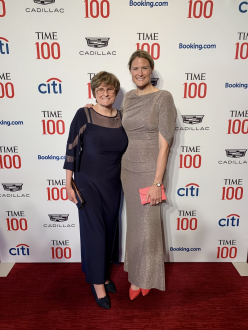
Katalin Karikó was named among the world's 100 most influential people by Time magazine in 2021. Accompanied by her equally famous daughter, the two-time Olympic champion and five-time world champion rower, Zsuzsanna Francia, the globally renowned mRNA researcher attended the prestigious gala.
"Katalin Karikó was voted the most influential person in Philadelphia. Her name and career are at the top of the ranking of "The 76 Most Influential People in Philadelphia", published at the end of November 2021," we announced two years ago on the SZTE news portal. The number is symbolic: a reference to the US Constitution, signed in Philadelphia in 1776, and to local and universal values.
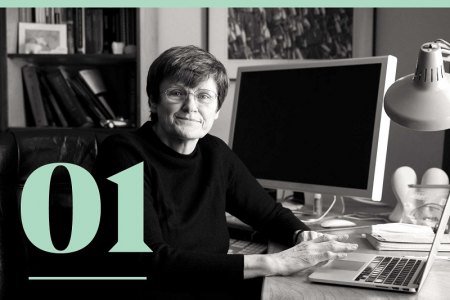
In 2021, Karikó Katalin was also recognized as the most influential personality in Philadelphia.
"Ahead of me, my successor?"
Karikó Katalin was talked about by Attila Gácser, a professor leading the Institute of Biology at the University of Szeged, in the radio magazine called "Nagyok" ("The Greats"). Proudly, he stated that he is the head of the institute where Karikó Katalin once studied.
Attila Gácser's research group is a recognized professional community in Hungarian immunological research. From his network of researchers and collaborations, he highlighted that Karikó Katalin, a research professor at the University of Szeged, mentors him. She supports his research on fungi from the Tang Prize. He also collaborates with Pardi Norbert, a graduate and doctoral student in the biology department at the University of Szeged, who came to the University of Pennsylvania upon the invitation of Karikó Katalin.
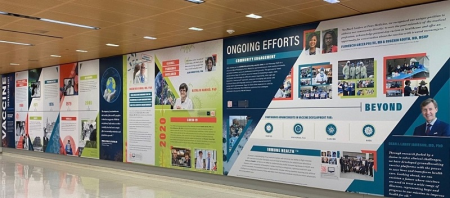
A form of public education is represented by a transparent display in the busy building of the University of Pennsylvania, showcasing the significance of the discovery made by their mentors, Karikó Katalin.
In November 2023, Attila Gácser visited the Pardi Laboratory at the University of Pennsylvania. In commemoration of this visit, two biologists who graduated from the University of Szeged took a joint photo in front of the transparency in the community space of the clinical center of the University of Pennsylvania. This photo showcases how Karikó Katalin, a researcher in mRNA, contributed to laying the foundation for the development of a crucial modern vaccine in combating the Covid-19 pandemic.
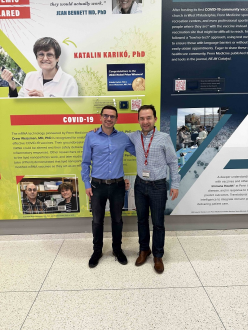
In November 2023, two alumni of the University of Szeged, Professor Attila Gácser (SZTE) and Norbert Pardi (University of Pennsylvania), stood in front of the Philadelphia display.
In her podcast, Annika Östman, a Swedish journalist who visited Budapest, Szeged, and Kisújszállás to celebrate the Nobel laureate Karikó Katalin, presents "From the Working Class to Covid Hero" Katalin Karikó, who "saved the world – against all odds."
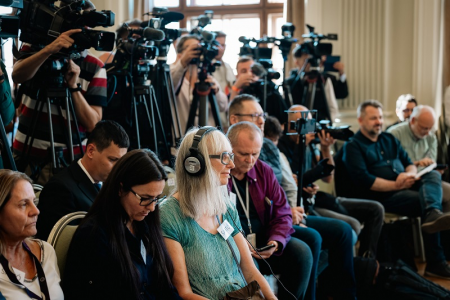
Annika Östman, who traveled from Sweden to Hungary for the October 12, 2023, press conference in Szeged, can be seen in the center with earphones.
Gold Medal for the Biochemist
On June 11, 2024, at 5:00 PM in Zurich, Katalin Karikó will deliver a lecture as part of the ceremony for the Paul Karrer Gold Medal recognition. The news revealed in late September 2023 holds significant connections to Szeged.
The Swiss Nobel laureate in chemistry, Paul Karrer, shared the recognition with Norman Haworth in 1937 for "research on carotenoids and flavins, as well as vitamins A and B2." For the citizens of the University of Szeged, the year 1937 is memorable because Professor Albert Szent-Györgyi started from the university laboratory in Dóm tér to Stockholm to receive the Nobel Prize in Physiology or Medicine for his discoveries related to the biological combustion process, especially his research with vitamin C and fumaric acid as catalysts.
The Paul Karrer Gold Medal is awarded to individuals who have received the University of Zurich's chemical distinction. For Katalin Karikó, this marks her second, specifically chemical, recognition. Notably, at the centenary of the first World Chemistry Conference in Brussels on March 29, 2022, she received the "Science for the Future Solvay Prize." The Solvay Prize was Karikó Katalin's first chemical accolade.
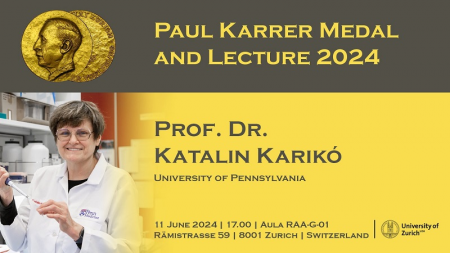
The medal associated with the award, established on Paul Karrer's 70th birthday in 1959, was crafted by Swiss sculptor Hermann Hubacher. The front of the medal bears the likeness of Paul Karrer, and the back features the inscription "University of Zurich – Paul Karrer Lecture."
Among the past recipients is the 2009 Nobel laureate in chemistry, Ada Yonath. The Israeli chemist has maintained a close connection with the University of Szeged since the conference held in 2012 to commemorate the 75th anniversary of Albert Szent-Györgyi's Nobel Prize. Ada Yonath's research focuses on the structure of ribosomes, macromolecular machines found in every cell, which play a crucial role in biological protein synthesis, i.e., mRNA translation. This common theme connects the two Nobel laureate scientists.
Meeting with the Governor
"In the field of mRNA technology, Covid-19 vaccines are just the beginning," emphasize the 2023 Nobel laureates in Physiology and Medicine. An article from Penn Today on November 22, 2023, mentions vaccination and treatment for peanut allergies, as well as promising developments in vaccines against malaria, genital herpes, Lyme disease, heart diseases, and influenza outbreaks.
The "Penn Institute for RNA Innovation" building was inaugurated at the University of Pennsylvania, with Katalin Karikó in attendance. The institute is led by Karikó Katalin's American research colleague, Drew Weissman, the "Roberts Family Professor of Vaccine Research," and Dr. James Hoxie. The modern building complex at UPenn houses RNA researchers working in the fields of biology, chemistry, immunology, modeling, vaccines, oncology, genetic diseases, and biomedical sciences.
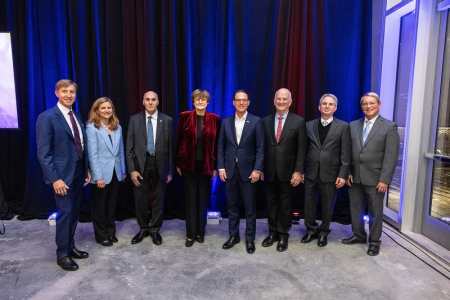
Participants in the Philadelphia building inauguration (left to right): J. Larry Jameson, Liz Magill, Drew Weissman, Katalin Karikó, Gov. Josh Shapiro, Kevin B. Mahoney, Jonathan A. Epstein, and James Hoxie.
"Science thrives on collaboration," emphasized Drew Weissman during the inauguration. He mentioned that the institute will collaborate with over 250 laboratories in the United States. James Hoxie, the institute's other leader, added, "Thanks to Drew and Kati's discovery, along with many colleagues along the way, we, the staff of the Penn Institute for RNA Innovation, feel truly capable of doing good in the world."
As Katalin Karikó and Drew Weissman prepared for the Nobel Prize ceremony in Stockholm, they received a surprise gift at the Philadelphia building inauguration from J. Larry Jameson. The Dean of the UPenn Perelman School of Medicine presented a framed photo showing, through the magic of Photoshop, the two researchers' legendary encounter at the photocopier in 1997. This gesture brought smiles to the faces of the researchers and set off Karikó Katalin and Drew Weissman on their way to the Nobel Prize ceremony.
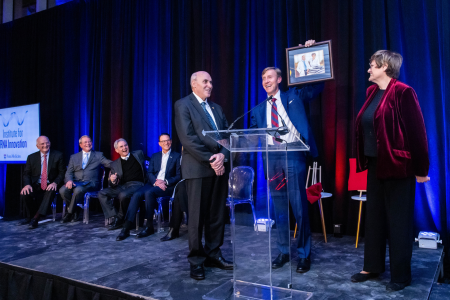
Governor Josh Shapiro was also present at the inauguration of the Philadelphia university building. We learned that sports enthusiast Shapiro is familiar with Zsuzsanna Francia, the two-time Olympic champion and mother of Karikó Katalin. The Nobel laureate researcher and the Governor of Pennsylvania engaged in a lengthy conversation. While standing in a quiet corridor near a cabinet displaying the awards won by the Karikó-Weissman research duo, they discussed the idea of showcasing the honors and documents of Karikó Katalin's career in a traveling exhibition organized by the University of Szeged. Governor Shapiro praised the exhibition titled "Karikó Katalin's Journey to the Lasker Award and Beyond" as a fantastic idea and an exemplary form of public education.
Title: Loss of Women's Talent
We previously reported that upon learning about the Nobel Prize awarded to her, Katalin Karikó expressed surprise, as she had been dismissed from her American university research position just a decade ago. Since then, several articles have detailed the implications of this story.
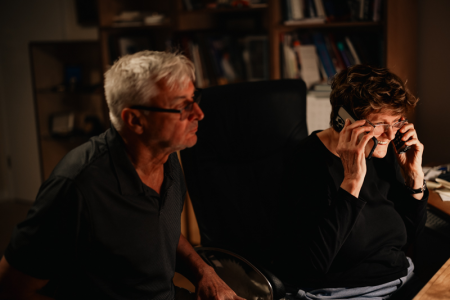
Katalin Karikó and her husband, Béla Francia, are pictured at their Philadelphia home on the morning of the Nobel Prize announcement. Photo: István Sahin-Tóth
In an article titled "How Your Money Supports Sexism in Academic Life – and What You Can Do About It", Robert Hegedus, writing for The Conversation, stated, "Biochemist Katalin Karikó's interest in mRNA therapeutic potential began in the early 1990s, but she received little encouragement. Throughout her academic career, she was undervalued, underfunded, and eventually left the academic field." However, when "she jointly received the Nobel Prize in Medicine for her pioneering role in developing mRNA technology, enabling the world to combat COVID, Karikó's former employer, the University of Pennsylvania, attempted to claim credit."
Forbes reported on October 6, 2023: "She received the Nobel Prize for the discovery of mRNA – and some academics ask Penn to apologize." The apology never came. Instead, the study titled "Academic Sexism Is Bad for Science, and a Waste of State Funding" was born. Published on nature.com on November 27, 2023, the article supports with data the damaging effects of the phenomenon highlighted by Katalin Karikó's and the Hungarian biochemist's American story.
"Katalin Karikó's story, before her involvement in the development of COVID-19 vaccines and the joint Nobel Prize win, was familiar to many women: faced with a lack of funding and recognition, she encountered demotion and eventually exclusion from the university. While Karikó managed to overcome these extraordinary obstacles, the majority of women respond to gender-based discrimination and harassment by leaving the scientific field," asserts the five-author publication, referencing a "massive study involving a quarter of a million American academics." The authors, as "current and former institutional and research leaders," declare that the loss of women's talent comes with significant scientific and economic sacrifices.
The nature.com article also formulates reforms to address the so-called Karikó problem and "enhance efficiency in the academic sector." Notably, the authors of this publication are researchers and leaders from institutions in Germany, Australia, the Netherlands, and Switzerland.
Articles on mRNA and the Scientists
The news of the shared 2023 Nobel Prize in Physiology and Medicine for Katalin Karikó and Drew Weissman, recognizing their pioneering role, has sparked a wave of popular science articles.
One such article titled The Evolution of mRNA Vaccines and the Challenge of COVID-19 Variants, adopting a Frequently Asked Questions (FAQ) style, from Express Healthcare Management explains the revolutionary discovery in modern medicine.
Even for the Nobel laureate, it becomes routine to verify that journalists accurately depict their work method with precision. Among the recipients of the 2023 Nobel Prize, the majority of articles likely recount the story of one of the world's most renowned research duos over and over again.
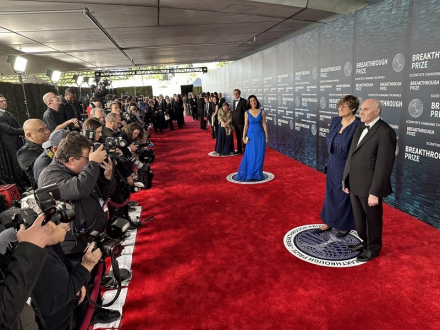
Biologist Katalin Karikó, a graduate of the University of Szeged, and Drew Weissman, who completed his studies in microbiology and immunology at Brandeis University, crossed paths at the University of Pennsylvania by a photocopier... The incredible molecule, mRNA, developed for medical therapy by Katalin Karikó, and the vaccines against infectious diseases crafted by Drew Weissman, culminated in their collaboration that began in 1997, resulting in nearly fifty jointly received awards and the Nobel Prize.
An article in The Guilfordian, published on October 13, 2023, underscores the significance of their research collaboration. Abigail Mocharnuk, summarizing the story, emphasizes that "the tale behind the two scientists is a story of perseverance and returning to fundamentals." Looking to the future, she believes that, thanks to the Karikó-Weissman research duo, "we are in a better position to combat diseases such as HIV and cancer." However, she singles out Katalin Karikó's story, noting that, as a result of articles following the announcement of the Nobel Prize, the "fight against discrimination in science" has reached a new level.
Book Success with ’Breakthroughs’
Katalin Karikó's memoir, titled "Breakthroughs – My Life and Science," reached readers in Hungary earlier than in the United States, where it is titled "Breaking Through – My Life in Science." As we reported, the Hungarian premiere of the book took place on October 11, 2023. The book is published by Crown in the United States.
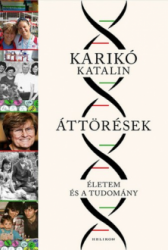
On November 16, 2023, The Bookseller https://www.thebookseller.com/rights/nobel-winning-karikos-memoir-signed-by-the-bodley-head announced as a sensation that "Bodley Head has acquired the memoir of Katalin Karikó, the 2023 Nobel laureate. Will Hammond, the deputy director of the publisher, secured the rights for the United Kingdom and the Commonwealth from Caspian Dennis at Abner Stein." The publisher has promised that the book will be "as honest, wise, and fearless as Karikó herself." The article highlights that Katalin Karikó continues her work "promoting new medical treatments where they are most urgently needed, even in the 'rain of awards.' She collaborates with her husband, Béla, the two-time Olympic rowing champion, Susan Francia's parents." The Bodley Head will release Katalin Karikó's autobiography in hardcover on January 25, 2024. However, as an audiobook, it will be available on December 7, 2023, just before the Nobel Prize ceremony on December 10.
Written by Ilona Újszászi
Teanslates by: E. SZ.
Photos by: K. K., István Sahin-Tóth, Ádám Kovács-Jerney
More information about Katalin Karikó, research professor at the University of Szeged, is available on the SZTE website, news portal and the website of the SZTE Klebelsberg Library.

